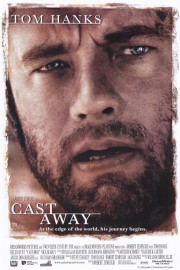Cast Away
The best film Robert Zemeckis has made outside of the 1980s is also his most low-tech, relatively speaking. It’s success likes in his ability to keep us immersed in the isolation and traumatic vantage point of Chuck Noland, and his trust in Tom Hanks to imbue the character with a humanity that even extends to a volleyball. It is some of the best work either man has ever done.
I forgot how much of “Cast Away” takes place off of the island that FedEx executive Chuck finds himself stranded on for four years, after a catastrophic plane crash over the Pacific Ocean shortly before Christmas. The prologue has him discussing efficiency in Russia, and sharing a family dinner with his girlfriend, Kelly (played by Helen Hunt), before he’s called for a trip on that fateful flight. And the last 30 minutes take place after Chuck is rescued. Those two sections make up about 45 minutes of this 143-minute film, and upon rewatching it for the first time in a while, that last stretch is as impactful as the 90-plus minutes before it, where Chuck is trying to figure out how to survive on his own. This is a film about showing us a man going through a trauma, and how he is changed, sometimes by force, as a result of it. That comes from the script by William Broyles Jr., and it is one of the most emotional pieces of material ever written on the subject.
One of the things that is so interesting about “Cast Away,” especially true in its second half, is how the film builds in motivations beyond simply survival for Chuck, and personalities that will drive those motivations. The watch Kelly gives him as a Christmas present, and the picture of her, gives him a reason to do what he can to try and survive while on the island. As he collects packages that have washed up on the shores, he eventually begins to open them, looking for supplies that may come in handy; he leaves one unopened, however- it is painted with wings, and it is further motivation for him to get off the island- so he has a purpose beyond survival. One of those packages contains a Wilson volleyball, who will become his companion after Chuck cuts his hand, and the blood makes a face on the volleyball. Wilson provides Chuck with something to keep him mind off of his isolation, and something to care for beyond himself, and Hanks and Zemeckis do a great job of humanizing Wilson to where, when he drifts away from the raft, we feel genuine empathy, goosed on by Alan Silvestri’s haunting, sparse score. But Wilson is another motivator that, when Chuck is at a particular checkpoint on his journey, he will shed, as Wilson is not needed as motivation anymore- his loss is part of Chuck regaining his humanity for when he returns to civilization.
The ending of this film lands like a gut punch, which it really did not do back in 2000. The film is, ultimately, about how Chuck finds his way through a traumatic experience, and grows in the process. That was not something that resonated with me at the time, but, as someone who has survived trauma of my own, it does now. It’s not about whether he gets back with Kelly in the end, but whether he can handle it if that’s not what is meant to happen, if she was just another thing motivating him to be the person he is meant to be. This is where “Forrest Gump” ultimately fails, and “Cast Away” succeeds brilliantly. Gump does not change over his story, but Chuck does. That’s why “Cast Away” feels like something timeless, despite its deep (and necessary) FedEx exposure, and “Gump” feels like something that is saccharine and schmaltzy, where, the more we think about it, the less we’re impressed. It wasn’t Hanks’s fault in that film; he’s just given so much more to do here, with- ironically- less material. It’s an actor’s showcase, and he’s rarely been better. It might be the best performance of his career, in a movie that more people should come back to, to see what happens when a director and actor are genuinely inspired.










